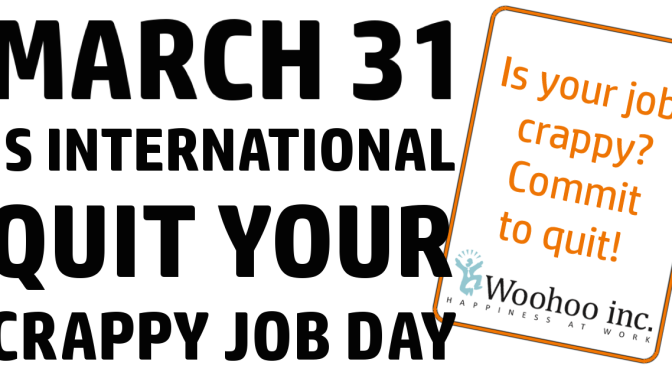
Here’s an interesting question that I got yesterday:
My husband and I are currently sitting on the sofa, enjoying our day off and writing down our goals for 2008. While doing so, my husband has brought up the topic of work. Here is his statement in a nutshell: I think you are very angry about work in general and need professional help.
In searching for “help,” I came across your website.
Here’s my question: after being laid off in September and being forced to change careers from the mortgage industry to a more secure industry is there “help” out there for dealing with the anger I now have because I was forced to change careers at 39 years old and what can I do in the meantime so that my “anger” doesn’t spill into my new career?
Thank You,
Yvonne
This question is interesting for many reasons, most notably because this is obviously making Yvonne unhappy at work in her new job. If it’s come to the point where her husband believes she needs professional help, it’s probably also affecting her at home.
Also, Yvonne is far from alone. A lot of people face major changes at work. When they are laid off, when their company is bought by a competitor or when major reorganizations fundamentally change their working conditions. Large scale change has become a fact of corporate life and many of us react to it by getting mad.
Below you’ll find my top 5 tips for dealing with anger when when you’re going through major change at work.
I apologize in advance for venturing maybe a little too close to therapy-land in this post. I honestly don’t want to go all Dr. Phil on you guys, but dealing with anger is not possible without taking a look at what goes on inside your head. OK? OK!
5 steps for dealing with anger at work
Step 1: Accept that being angry is perfectly natural
When we’re faced with large changes in life and at work, we all have to go through the grief cycle, which has the following stages:
- Denial: The initial stage: “It can’t be happening.”
- Anger: “Why me? It’s not fair.”
- Bargaining: “Just let me live to see my children graduate.”
- Depression: “I’m so sad, why bother with anything?”
- Acceptance: “It’s going to be OK.”
I’m honestly not sure how scientifically established this model is, but I certainly find it very useful in the work I do with organizations that are going through major change.
Last year, I did some work with a branch of the Danish Tax Authority – an organization that has gone through enormous change and reorganization in the last year.
When I presented a simplified version of this model to them, I could see people breathing sighs of relief. One participant even exclaimed “NOW you tell us!” Many of them had been angry or depressed about these changes, but nobody had told them that this is normal. Consequently, many of them felt bad about what they were feeling – which of course only made them more angry or depressed.
It’s important to accept your own anger as perfectly OK. Being angry is hard enough. Being angry while telling yourself “I really mustn’t be angry” is infinitely worse :o)
This does not give you blanket permission to throw tantrums right and left – it just means that being angry is OK, not that every display of anger is allowed.
Step 2: Find out what your anger does for you – good or bad
What does being angry do for you? Think back to previous situations where you have been angry at work and ask yourself how it affects eg.:
- You
- Your relationships with co-workers
- The quality of your work
- Your energy
- Your well-being and health
- How you feel outside of work
- Your relationships with friends and family
For each of these, include both the good and the bad. Maybe being angry gives you a lot of clout and influence on the job… but it also means that co-workers tend to avoid you. Maybe being angry feels stressful… but it also saves you from being taken advantage of at work.
And here is a crucial question: What other emotions, questions and doubts are you free from dealing with because you’re angry? When your anger consumes you, which other painful or difficult considerations are you free from thinking about? What would you have to feel/think about/deal with/do something about if you were not angry?
Step 3: Find out what makes you angrier and less angry
What makes you angrier? Which thoughts, situations, people, conversations set you off?
Conversely, what makes you less angry? I’m sure you’re not angry every second of every day :o) What gives you peace – or at least distracts you from the anger?
Find out – then start doing less of what makes you angry and more of the things that calm you down.
Step 4: Focus on gratitude
What are you grateful for? As I mentioned above, anger is part of the grief cycle which is associated with loss. Gratitude is the polar opposite of loss, because it obviously comes from the good things you have in your life.
It’s simple. Every evening, sit down with a piece of paper (and maybe a glass of wine) and make two gratitude lists:
- 3 things I was grateful for at work today
- 3 things I was grateful for in life today
It can be big things or small things – obvious stuff or weird stuff. Whatever makes you feel happy and grateful.
If you need some inspiration, check out Scott Nutter who has been doing daily gratitude posts on his blog for 334 days running now.
Step 5: Shift your focus from “What was done to me” to “What I can do”
I know, I know – this is the basic staple of all self-help advice.
As in “When life gives you lemons make lemonade.”
As in “Life is 10% about what happens to you and 90% about how you deal with it.”
As in “You must take responsibility for your own situation, rather than be a victim of.”
That kind of advice can get pretty nauseating. But that doesn’t make it any less true.
3 things NOT to do
There are also some things you should avoid doing.
1: Don’t vent
Common knowledge holds that when you’re angry, you should vent to get it off your chest. Interestingly, studies indicate that venting just makes us even angrier.
2: Don’t try to justify your anger
When you’re feeling angry don’t waste time and energy justifying it – either to yourself or others.
Well that guy was a jerk at the staff meeting and the way I was treated in the last reorg was totally unfair and my manager still hasn’t apologized and some guy cut me off in traffic on the way home and…
You’re angry, that’s enough. You don’t have to list all the reasons why you’re angry. Again, that just makes you even angrier.
3: Don’t stay trapped in your job
There is an amazing amount of peace and calm to be found in the simple fact that “I’m free to leave and find another job.” Conversely, knowing that you’re trapped in your current job makes everything much worse.
Read my previous posts on How to lose your fear of being fired and the Top 10 advantages of low-rent living for more on this.
Your take
What about you? Have you tried being really angry because of major changes in your work life? How did it affect you? How did you handle it? Please write a comment, I’d really like to know!
Related posts
- The Feel Factor – Why no workplace can afford to ignore what people feel
- How not to let annoying people annoy you
- How to turn around a bad day at work







 Creating peak experiences for employees and customers is a no-brainer. You gotta do it.
Creating peak experiences for employees and customers is a no-brainer. You gotta do it. A while back I got
A while back I got 






 My friend Annette (who is the CEO of
My friend Annette (who is the CEO of 

